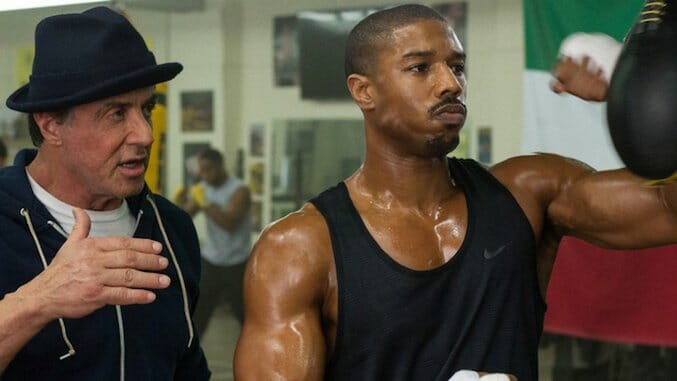Creed

There’s an alternate timeline in which Creed is a superfluous waste of nostalgia. In that universe, Warner Bros. gave the reins to a filmmaker other than Ryan Coogler, the young Oakland-born director who stunned viewers in 2013 with Fruitvale Station, a bio-drama about the death of Oscar Grant. Maybe Coogler is the last person anyone might expect to take up Sylvester Stallone’s mantle and breathe new life into the long-abiding, conditionally beloved Rocky franchise. Fruitvale Station, after all, doesn’t suggest Coogler’s ability at orchestrating thrills in the square circle. It’s socially conscious art made for a moment in American history where our nation remains undecided as to whether black lives matter or not.
There’s a chance that Creed might have turned out just fine without Coogler at the helm. But that version of Creed would lack the chief detail that makes Coogler’s film so good: perspective. Structurally, Creed is nearly a beat-for-beat remake of Rocky, which is fine if not particularly exciting on paper. It’s different, though, because it isn’t about Rocky Balboa at all. It’s about Adonis (Michael B. Jordan), the son of Rocky’s rival-turned-best friend, Apollo Creed, whom we first meet in juvie pummeling an older, larger boy while their fellow delinquents cheer and jeer them on. Apollo died in 1985, when Rocky IV and Dolph Lundgren both proved to be too much for him to withstand. Adonis, a child of one of Apollo’s extramarital affairs, never knew the man or became acquainted with his reputation.
Creed plays with the idea of fatherhood in absentia through Adonis’ struggle to make a name for himself while honoring his dad’s. Adonis, or “Donnie,” is raised by Mary Anne (Phylicia Rashad), Apollo’s widow, out of a sense of compassion and duty, and she tries her best to steer him away from a boxer’s life. As Donnie gets older and more recalcitrant, though, her efforts are spurned. “I ought to knock you out myself,” she fumes when he comes home with a shiner after pissing off trained, tested boxers with his raw braggadocio. (It’s a moment of frustrated parenthood that Ta-Nehisi Coates would identify with instantly.) He can’t help but fight, even though he doesn’t need to. Mary Anne has wealth and means, and subsequently so does Donnie. So why fight at all?
That’s the fundamental question Donnie and Creed have to answer to succeed, though maybe the better question is, “What’s worth fighting for?” Creed checks about every box it can in reply to that query: Pride. Honor. Dignity. Self-respect. Family name. The adrenaline boost of being in the arena. It saves the best, and most important, answer for last, though, and that’s personhood. He’s fighting to prove himself in deep, existential ways. Donnie has no connection to his dad except through video footage of his matches (which Donnie shadowboxes to). His best bet at finding that connection is through Rocky, and because Creed is a Rocky film, it inevitably must trot out the champ. So Donnie makes for Philly and harangues Rocky into training him.
-

-

-

-

-

-

-

-

-

-

-

-

-

-

-

-

-

-

-

-

-

-

-

-

-

-

-

-

-

-

-

-

-

-

-

-

-

-

-

-








































